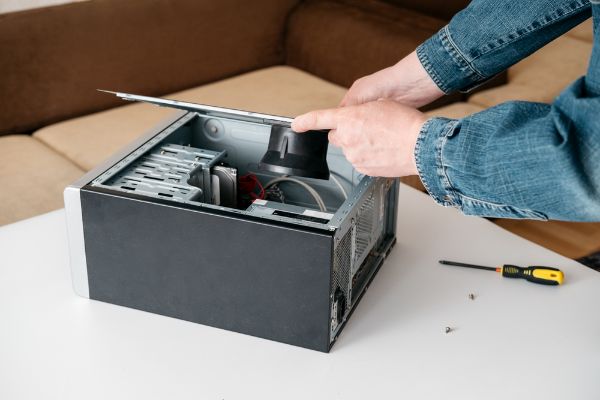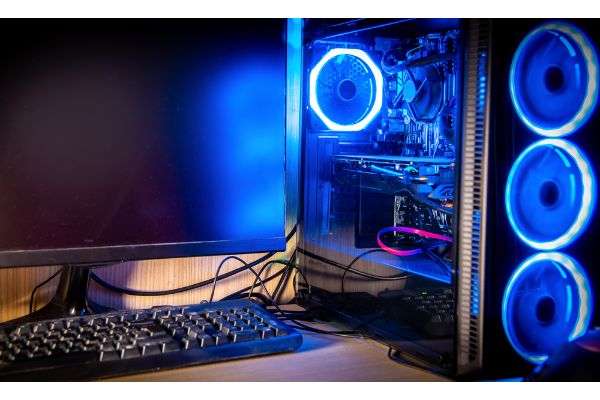Disclaimer: This post may contain affiliate links, meaning we get a small commission if you make a purchase through our links, at no cost to you. For more information, please visit our Disclaimer Page.
The standard desktop case is one of the most well-known parts of a PC, and it is something that most people will think of as the computer itself.
In truth, what makes up a computer is the sum of all the components that rest securely inside the case or tower, and this speaks to the importance of the seemingly simple box that sits next to the monitor and keyboard for most of the PC setups you’re likely to encounter.
These cases come in different sizes or configurations, and some users or hobbyists wonder if smaller PC case frames might be better than their larger counterparts. We’ll go over some of the different views on this topic, and we will address some of the specific issues that might crop up with cases of smaller sizes.
Table of Contents
Are Smaller PC Cases Better?
There are two major considerations with smaller PC cases going up against their larger counterparts. On one hand, it can depend on your preferences, but you’ll also need to take into consideration what you’d like to do with the computer and its hardware.
Ultimately, this second consideration plays a big role in whether a small or large case for your desktop computer is a better option for you as a user. Most computer cases you will see on the market come in three main sizes, and you can pick the size that best suits your needs, budget, or both.
Many hobbyists or enthusiasts would probably consider a full tower case to be a very large form factor for an enclosure. They are both longer and deeper than their mid-tower cousins.
While most everyday desktop users probably don’t need a full tower, their huge size relative to other form factors you can buy might make them a good choice if you are building your own custom rig that you want to fill with a lot of unique extras. These additions might include tons of storage, special cooling facilities, or graphics card setups that use several chipsets.
The mid-tower case is probably the one that most people think of when they picture a desktop computer setup. They are not as big as a full version, but they are still tall enough to look like a tower sticking up next to the monitor.
They work well for most users because they are still large enough to fit all the necessary components for a PC to run, have a closed cooling system, and have enough space to fit at least a couple of graphics cards that can help people run most programs out there.
Theoretically, you can build a perfectly fine gaming PC that can run resource-intense games using the right mid-tower setup.
Finally, the mini-tower cases are the smallest usual form factor that you’ll see out there. You may see them listed as mini-ITX cases, and this is because they are designed to support a special class of motherboard called the mini-ITX.
Because these are not full-sized motherboards, mini-tower cases also have some other limitations in terms of what they can do or the kinds of hardware they can take on.
The form factor means that most setups for these kinds of cases can be basic, but they are also quite portable.
What Are Some Problems With a Small PC Case? (4 Issues)
Small computer cases can be great options for lightweight builds that you can take to a LAN party or otherwise transport easily. If you know what you want as a user, they can be a great alternative to the larger enclosures out there.
However, as we touched on, there are some possible limitations that some hobbyists could find problematic. Some of these issues are down to how the systems are configured, and you may not notice them if you do your PC setup in a particular way.
Other concerns can crop up regardless of how you choose to do your build, and they are simply a result of the small form factor itself. So here are some issues associated with a small PC case.
1. The small size of these kinds of cases can make it harder to build inside them. If you are putting together your own rig, you’ll be constrained by the space limitations inside the case.
Of course, there are ways to put some of your setup together outside the case beforehand, but you’ll still need to be mindful when it comes to getting everything inside the enclosure, connected, and working.
2. On a related note, cable management can be harder inside a smaller form factor as well. A bigger case gives you more options to manage your cables in ways that keep them tight or orderly as you might like. With limited space, you may have to take what you can get when it comes to how your cables are arranged.
The main thing is to give them solid connections to components, and you may have to settle for a look that you don’t necessarily prefer in order to facilitate these connections.
3. It may be difficult to find proper components that fit into your smaller PC case. While these kinds of cases exist to house smaller motherboards, it may not be easy to find all the parts you want in the sizes that you need for your build. They are out there, but you might be limited in the choices you have for cases of this size.
4. There are possible airflow issues with smaller cases, but this is not necessarily a given. Therefore, we will go over this issue in detail in our next section.
Does a Smaller PC Case Get Hotter Than a Bigger One?
Depending on how you build your PC, a smaller case can get hotter than a bigger one. This is mainly down to the size constraints of a smaller case and the components it can or cannot house effectively. With a small case, there is less surface area.
While that means less area to cool, it also means you don’t have as much space for fans or other types of cooling setups that can keep all the components from getting too hot. Also, consider that the components you do install will be in cramped quarters generating their own heat signatures as they do the work you need.
All of this doesn’t necessarily mean a small case will overheat, but these factors can present issues.
Mostly, it can really depend on the case as to whether things get too hot or there is not enough airflow. More fans across a bigger space won’t necessarily keep things cool if things are still cramped in your mid-tower case, for example. It comes down to the size of the case, but it also has to do with your setup.
If a smaller case has all the components near cooling units, things could run just fine. In fact, if you can set your CPU and GPU in such a way that they get immediate benefits from cooling fans or other devices, it will offset a lot of the heat generation in your rig.
If the components are not too cramped, they may not share enough heat for there to be a significant problem.
Is It Better To Have a Bigger or Smaller PC Case?
Whether the bigger or smaller PC cases are better depends on use cases and individual preferences more than anything else. Do you need a desktop setup that is relatively easy to transport because you want to take it with you often?
A small case and the components inside it may be a nice compromise between a full desktop rig and a laptop or tablet.
Most larger cases might be better for cooling, but keep in mind that small cases can cool their components just fine with proper airflow.
If you don’t need a resource-intense PC and have some space considerations, a smaller case might be better for your needs.
In short, it depends on what you like and what you need your computer to do for you. There are some small setups that can house some pretty powerful components, too.
Are Mini PC Cases Worth It?
Many users love the space-saving that comes with a smaller form factor. They also appreciate that the specially designed miniature motherboards allow manufacturers to think outside the usual box when it comes to designing PC components.
They are smaller, lighter, and usually cost less than their larger counterparts. It is important to point out that miniature builds can be tricked out with expensive components, too. If you’d like to make your own, you may shop around for some of the best parts that can fit in that small space.
However, a build you get off the shelf should be somewhat cheaper than its larger cousins, although it may have a few features missing.
These builds can also be a bit more challenging to revise or add to as you go, but some users put that challenge firmly in the “worth it” camp.
Conclusion
Smaller PC cases seem to represent a somewhat fresh, fun look that differs from traditional towers while still offering much of the same functionality.
They can be great to build on as projects for enthusiasts, but they’re also available for purchase to anyone who wants a lighter, smaller desktop without going for the laptop experience.
With some considerations and thoughtfulness, they can run just as well as a larger desktop PC case and setup.


